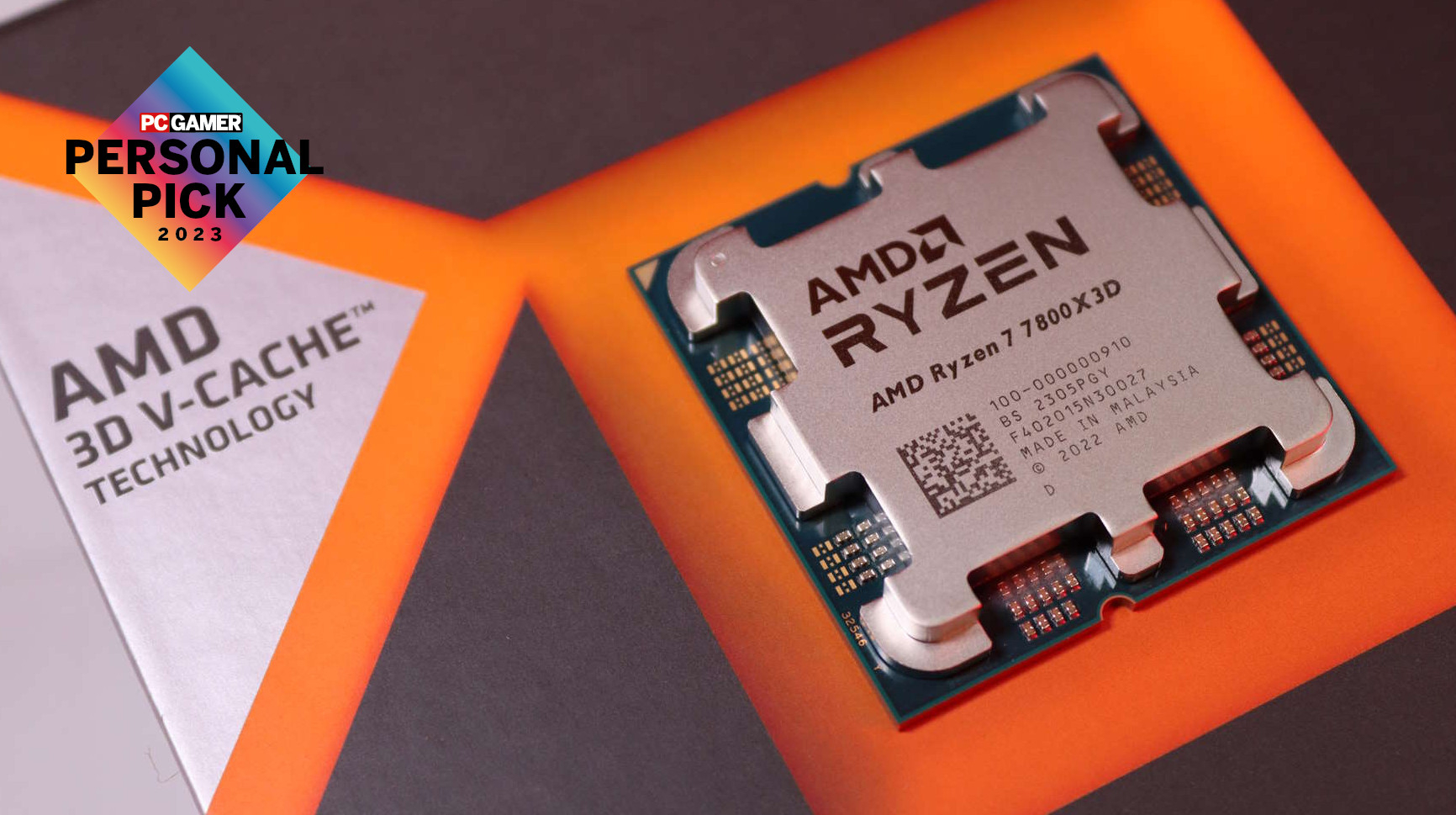When the bossman asked the PC Gamer hardware team to select our personal picks for hardware of the year, I thought about it, and then thought about it some more. As a reviewer that covers a lot of components, my shortlist came down to five items. The Intel Core i5 14600K, Nvidia RTX 4070, ASRock Z790 Taichi Lite and the Alienware OLED 34 AW3423DWF monitor. But in the end, I went with AMD Ryzen 7 7800X3D.
At this point in time, there’s no such thing as the perfect CPU. The Core i9 14900K is very good, but it runs hot and consumes a lot of power. The Core i5 14600K is also an excellent chip, but it’s not revolutionary compared to the Core i5 of 12600K and 13600K fame. AMD’s higher core count chips are decent enough, but the Ryzen 9 7950X3D doesn’t do enough over the Ryzen 7 7800X3D for me to consider it. And it’s expensive. That leaves AMD’s 7800X3D on its own. I chose it because it’s a gaming chip first and foremost, and unlike most gaming oriented hardware, it’s not exorbitantly priced.
Dave’s review of the 7800X3D summed it up nicely. “For pure gaming power and supreme efficiency, the Ryzen 7 7800X3D is a fantastic CPU.” I agree wholeheartedly. These are my number one and two criteria when considering a CPU.
The 7800X3D is an eight-core chip with 96MB of L3 cache, made up of the standard 32MB, with another 64MB stacked on top. Some games love it, others benefit little, but in general, cache and clock speed is more important than cores for gaming, once you go above eight that is.
I value multitasking and gaming performance highly, preferably with good power efficiency, low cooling requirements and value for money. The Ryzen 7 7800X3D delivers
About the only drawback is that I feel the 7800X3D’s clock speed is conservative. The otherwise similar 7700X non-X3D can boost to 5.4GHz, while the 7800X3D is lower at 5.0 GHz. Thankfully, in the real world, systems with anything less than a high-end GPU mean a sub-10% clock speed difference isn’t critical. But there’s an upside. The benefit of a lower clock speed means the 7800X3D is a stunningly power efficient chip that doesn’t require a high-end cooling solution or stupidly high fan speeds. That rates very highly in my book.
(Image credit: Future)
Best CPU for gaming: The top chips from Intel and AMD.
Best gaming motherboard: The right boards.
Best graphics card: Your perfect pixel-pusher awaits.
Best SSD for gaming: Get into the game ahead of the rest.
The 7800X3D can be found well below its $449 launch price. At the time of writing the 7800X3D is just $359 at Newegg. High-end chips are a couple of hundred dollars more but don’t deliver the big performance boost you’ll get from spending an extra $200 on a better graphics card. That’s where the truly significant performance gains come from.
There’s another benefit. Buying an accompanying X670 or B650 motherboard gives you a solid upgrade path. It’s all but guaranteed you’ll be able to drop a future Zen 5 and likely even a Zen 6 chip into such a board with just a BIOS update. That contrasts with Intel’s current 700-series motherboards. A future Intel upgrade will absolutely require a new motherboard.
The 7800X3D isn’t perfect, There are better options if you need a chip for heavily threaded productivity tasks. Personally, I don’t need a chip for that except for once in a blue moon. I value multitasking and gaming performance highly, preferably with good power efficiency, low cooling requirements and value for money. The Ryzen 7 7800X3D delivers. Add to that a solid upgrade path (with 16 PCIe 5.0 lanes for a GPU with another four for a PCIe 5.0 SSD) and the choice is made. The Ryzen 7 7800X3D is my pick of the year.










